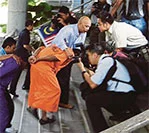CRIME AND CONSEQUENCE: The government must make sure that the penalties far outweigh the rewards
UP to a million Malaysian parents are rightly up in arms at the leak of sixth grade Ujian Pencapaian Sekolah Rendah (UPSR) examination papers. Well, some of them are, anyway. Let us hope though that their anger is for the right reasons and that they understand what is at stake.
Of course, it is dispiriting for the 473,175 children to have to retake the exams, especially those facing parental pressure to do well. Naturally, it is costly for exams to be rescheduled and disappointing that holiday plans have to be postponed or put aside.
Time and money would be bad enough. The fact is that the costs run much wider and deeper. It shapes social norms and behaviour by rewarding the bad and penalising the good.
Yes, the leaks are “shameful” and “embarrassing”, as the Deputy Prime Minister and Education Minister Tan Sri Muhyiddin Yassin has said. Most assuredly, operating procedures have to be strengthened.
The education minister is also correct in saying that Malaysians should not be “so worked up” about examinations and that society should change the way it views them. It would be helpful if the ministry first led the way in this.
Examinations are one important instrument to assess achievement and levels of understanding, in school, college and the work place. And we are talking about the masses here, hundred of thousands, if not millions, and not any individual.
Given that they are a fact of life, the urge to try and gain the upper hand is universal. Students have long prepared crib notes or cheat sheets and devised ingenious ways to hide them.
Some have apparently been successful in hacking into their school computers. I understand that some tuition centres sell their services by promising to help students prepare for questions given by “inside sources”.
Leaking exam papers is just one way to cheat and not a particularly clever one at that. You would have thought students would have learned by now that leaked exam papers just means having to retake them.
Imagine if one-half of all students successfully cheated on an examination in a year, while the other half did not. The cheaters would naturally tend to do a lot better than the non-cheaters.
Some non-cheaters may be smart enough to do equally well or better than cheaters, but the vast majority would be relegated to relatively lower grades.
Since good grades usually mean better classes and teachers, higher social status and improved access to prime tertiary institutions, bad behaviour is rewarded while good behaviour is penalised.
The moral few that insist on maintaining their integrity would not be applauded when the final results come out. If anything, they might even be scorned. Given the incentives and disincentives, the demand to cheat would logically rise in the following year.
Questions of morality aside, one simply faces a real-life penalty if one does not do so. Even though cheaters do not personally gain by encouraging others to do the same, cheaters would form the majority of cohorts.
When cheaters dominate any system, the very credibility of that system is called into question. Do not forget that examinations help to determine those with higher levels of understanding and competency.
Educators at receiving academic institutions and potential employers are among the first to detect these differences and not surprisingly take the necessary actions to protect their interests. They start to lose faith in the system.
Is it any wonder then that even our brightest students are unable to secure places in top schools and some of our most prestigious qualifications are not recognised? The end result is a lose-lose outcome for all, cheaters and non-cheaters alike.
Exam cheating is not entirely, or even in large part, to blame of course. The lowering of teaching and examination standards would, I suspect, play a much larger role in any discrediting of educational quality.
No surprises then that those that can afford it have sent their precious ones to private schools or abroad. This further heightens disparities in educational quality received.
Thus the government must ensure that exam cheaters, like those who abuse their power or are corrupt and criminal, face more penalties than rewards from cheating. If not, the system faces degradation and the associated negative effects.
Coming back to the issue of examination paper leaks, this latest round was, of course not the first. Forty years ago, I had to resit papers in the (then) Malaysian Certificate of Examination. The Malaysia Education Blueprint had better start to be a reality real fast.
Article by Dato’ Steven Wong which appeared in New Straits Times,
23 September 2014.





